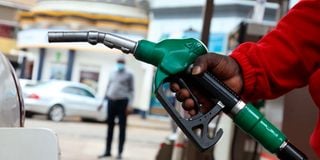Premium
It’s compensation, not subsidy, State says on fuel prices

A fuel attendant holding a fuel pump at the filling station along Kimathi Street, Nairobi.
The government has rejected the characterisation of Monday’s pump price intervention as a “subsidy”, preferring to describe it as a “compensation” to oil marketers as provided for in the Petroleum Development Levy Order of 2020.
The Energy and Petroleum Regulatory Authority (Epra) said that the Sh7.33, Sh3.59 and Sh5.74 per litre of premium, diesel and kerosene, respectively, meant to retain the pump prices as they are, will be paid from the Petroleum Development Fund (PDF) without any support from the National Treasury.
Epra Director-General Daniel Kiptoo said this intervention will consume half of the funds currently available in the PDF.
“About Sh3.5 billion is available in the Petroleum Development Fund account. Only Sh1.8 billion will be used to stabilise petrol pump prices announced on August 15, 2023,” Mr Kiptoo said.
However, Epra was unable to explain why it changed the terminology in its monthly releases from “compensation” to “subsidy” during the first pump price review under the Kenya Kwanza government on September 14, 2022.
“Taking into account the weighted average cost of imported refined petroleum products and in line with the government’s policy of phasing out subsidy on petroleum fuels, the changes in the maximum allowable pump prices of petroleum products in Nairobi are as follows: Premium, diesel and kerosene will increase by Sh20.18, Sh25 and Sh20 per litre respectively,” Epra said in the September 2022 release.
Just a month earlier, in its August 14, 2022 price review, Epra described the same intervention as “compensation” rather than “subsidy”.
“The applicable pump prices for this cycle have been maintained as those applicable in the immediately preceding cycle. The government will use the Petroleum Development Levy to cushion consumers from otherwise high prices, with the differences being compensated by the Petroleum Development Fund,” it said.
Mr Kiptoo was unable to explain how this change in terminology came about.
“The provision outlined in the Petroleum Development Order of 2020 relates to the stabilisation of pump prices of petroleum products. This provision was implemented in the release that took place yesterday,” Mr Kiptoo said in his response to the Nation.
The Nation also wanted to know why, if the PDF was adequately funded to support market intervention in the August price review, the government was forced to securitise arrears to oil marketing companies to the tune of Sh43 billion through the issuance of a triple bond just two months earlier. According to Epra, the move was necessitated by the fact that arrears from the Jubilee administration’s subsidy regime far exceeded the capacity of the fund.
“The previous stabilisation needs were far beyond the level of funds that required support from the Treasury,” said Mr Kiptoo.
Further, the Nation sought to know whether there was a sound rationale for levying Sh5.40 per litre as petroleum development levy on premium grade petrol, only to give Sh7.33 in return as compensation to oil marketers through the latest intervention. The same is true for kerosene where the government collects Sh0.40 per litre, only to extend Sh5.74 as compensation.
Epra said the extra for both premium and kerosene compensation is adequately funded through the PDF.
“PDF is collected monthly and therefore the excess will be met based on the previous months’ collections,” Mr Kiptoo said.





